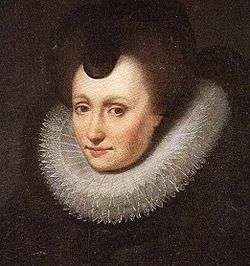Louise de Coligny
Louise de Coligny (23 September 1555 – 9 November 1620) was a Princess consort of Orange as the fourth and last spouse of William the Silent. She was the daughter of Gaspard II de Coligny and Charlotte de Laval.
| Louise de Coligny | |
|---|---|
 | |
| Princess consort of Orange | |
| Tenure | 24 April 1583 – 10 July 1584 |
| Born | 23 September 1555 Châtillon-sur-Loing |
| Died | 9 November 1620 (aged 65) Fontainebleau |
| Spouse | Charles de Teligny William I, Prince of Orange |
| Issue | Frederick Henry, Prince of Orange |
| House | Coligny |
| Father | Gaspard II de Coligny |
| Mother | Charlotte de Laval |
| Religion | Huguenot |
Biography
Louise was born at Châtillon-sur-Loing. Her parents saw to it that she received a humanist education.[1] When she was sixteen, she married Protestant Charles de Téligny (1571). Both he and her father were murdered at the St. Bartholomew's Day massacre. Like her murdered father, she was a French Huguenot and after the massacre (August 1572 -Paris), she spent ten years in the Swiss Confederacy.
She then married William the Silent on 24 April 1583. She became the mother of Frederick Henry in 1584, William's fourth legitimate son and future prince of Orange. It is said that she warned her husband about Balthasar Gérard, because she thought him sinister. Catholic Gérard murdered William in July 1584 in Delft.
After her husband was murdered, she raised their son and William's six daughters from his third marriage to Charlotte of Bourbon. During her life she remained an advocate for Protestantism and she corresponded with many important figures of that time, like Elizabeth I of England, Henry IV of France, Marie de' Medici and Philippe de Mornay, as well as with her many stepchildren. She remained in the Dutch Republic until 1620, after the denouement of the political conflict between her stepson, stadtholder Maurice, Prince of Orange (son out of the marriage of William the Silent with his second wife Anna of Saxony) and the Land's Advocate of Holland, Johan van Oldenbarnevelt. After Oldenbarnevelt was sentenced to death in the Trial of Oldenbarnevelt, Grotius and Hogerbeets, she and the French ambassador Benjamin Aubery du Maurier tried in vain to have the death sentence commuted.
She died (65) at Fontainebleau.
Notes
- Couchman & Crabb 2005, p. 163.
References
- Couchman, Jane; Crabb, Ann (2005). Women's letters across Europe, 1400–1700: form and persuasion. Ashgate.CS1 maint: ref=harv (link)